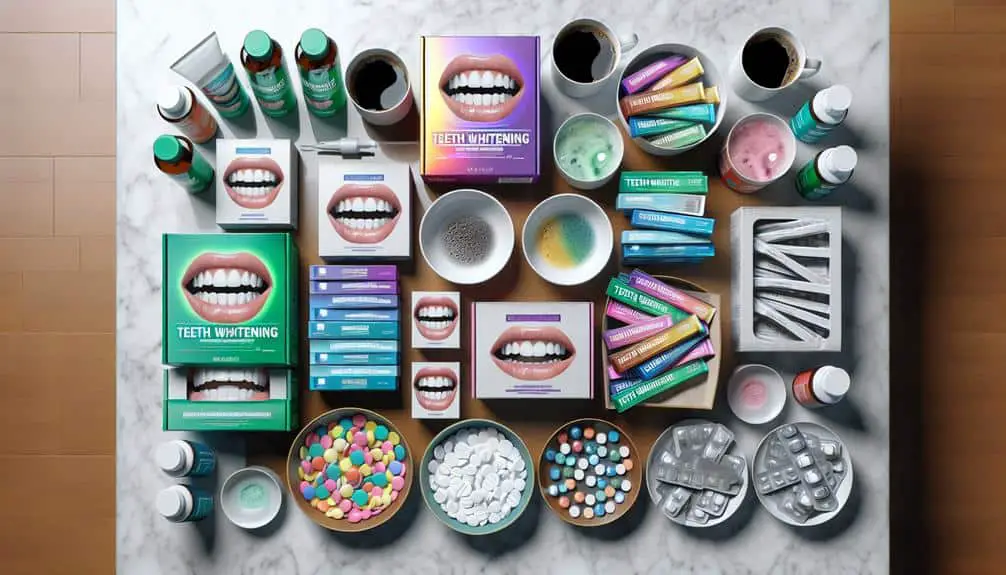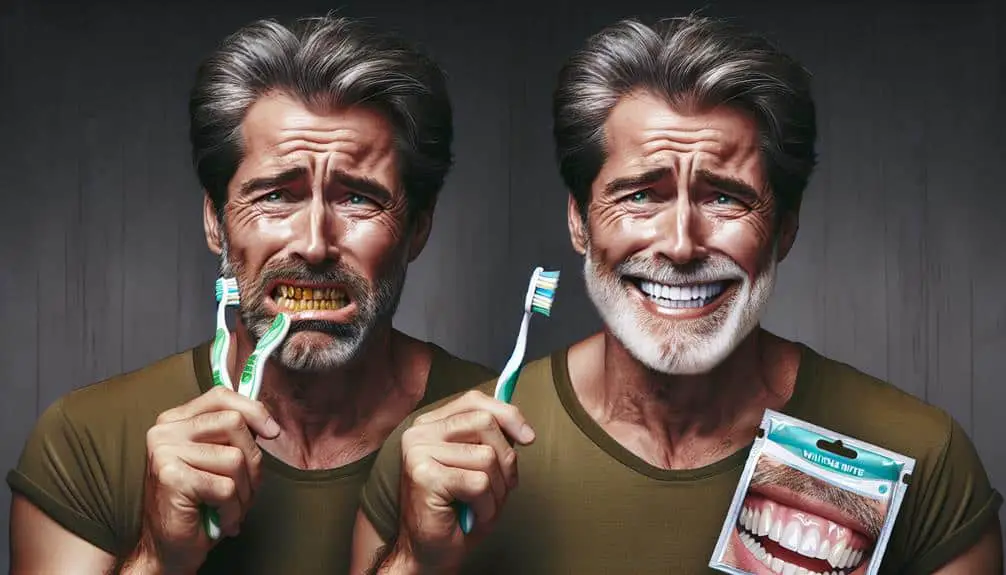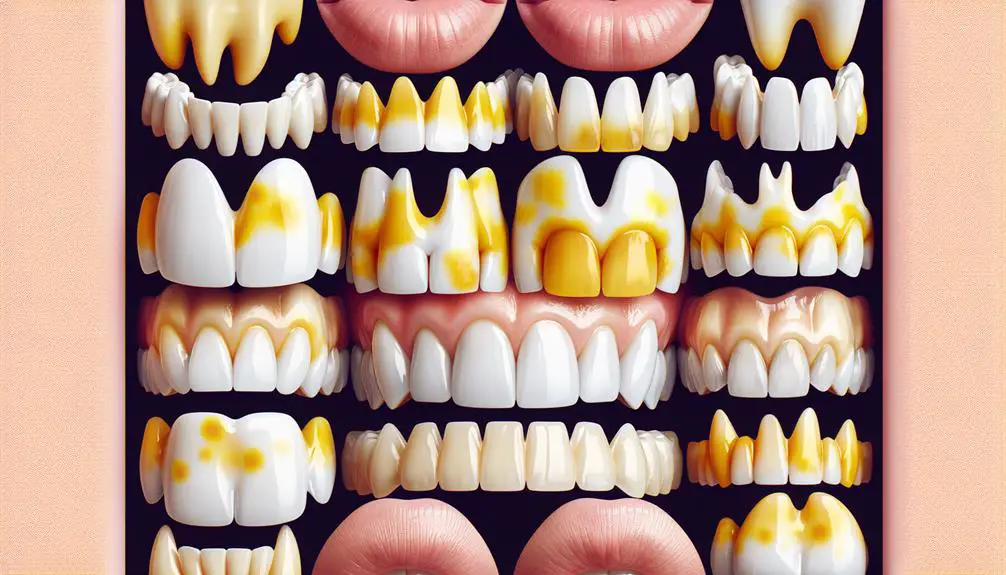To effectively remove medication stains at home, try these methods: Use over-the-counter whitening toothpaste with mild abrasives like baking soda or hydrogen peroxide. Make a hydrogen peroxide rinse by mixing it with water; swish for 30 seconds to lighten stains. Create a paste with baking soda and water, apply, let it sit, then scrub gently and rinse. Apply lemon juice directly to stains or mix with water for tougher ones, but test first. Try activated charcoal for its absorbency and odor-neutralizing properties. These simple yet powerful methods can restore freshness to your fabrics and surfaces with ease.
Key Points
- Try hydrogen peroxide rinse for potent stain removal.
- Use baking soda paste to gently scrub away stains.
- Apply lemon juice as a natural whitening agent.
- Consider activated charcoal for effective stain absorption.
- Opt for over-the-counter whitening toothpaste for convenient stain removal.
Over-The-Counter Whitening Toothpaste Options
For tackling medication stains at home, consider trying out over-the-counter whitening toothpaste options for a cost-effective solution that may help brighten your smile. These toothpaste products contain mild abrasives that can assist in removing surface stains caused by medications. When selecting a whitening toothpaste, look for ingredients like baking soda, hydrogen peroxide, or silica, as they're known for their stain-fighting properties.
DIY solutions involving over-the-counter whitening toothpaste can be a great starting point before considering professional options. Whitening toothpaste is convenient and easy to use. Simply brush your teeth thoroughly with the whitening toothpaste twice a day to help diminish medication stains over time. While these toothpaste options may not provide the same level of effectiveness as professional treatments, they can still make a noticeable difference in reducing the appearance of stains, especially when used consistently.
Before exploring professional options, incorporating over-the-counter whitening toothpaste into your oral care routine can be a proactive step towards combating medication stains and maintaining a brighter, healthier smile.
Hydrogen Peroxide Rinse for Stain Removal
Consider enhancing the effectiveness of your stain removal routine by incorporating a hydrogen peroxide rinse into your oral care regimen. Hydrogen peroxide is a potent oxidizing agent that can help break down and eliminate medication stains on your teeth.
To create a hydrogen peroxide rinse, mix equal parts of hydrogen peroxide and water. Swish this solution around in your mouth for about 30 seconds, being careful not to swallow it. Spit out the rinse and then rinse your mouth thoroughly with water.
Hydrogen peroxide can effectively lighten medication stains over time with regular use. It's important to note that hydrogen peroxide should be used with caution and not too frequently to avoid damaging your tooth enamel.
In addition to using a hydrogen peroxide rinse, you can also try other natural remedies like a vinegar solution or a salt scrub to help remove medication stains. These methods can complement each other and provide a more all-encompassing approach to stain removal. Remember to consult with your dentist if you have any concerns about medication stains or oral care.
Baking Soda and Water Paste
Enhance your stain removal arsenal with a simple yet effective baking soda and water paste. This natural remedy can help tackle medication stains effectively. Here's how you can use baking soda and water paste to remove stains:
- Create the Paste: Mix baking soda with water to form a thick paste.
- Apply on Stain: Gently apply the paste onto the stained area.
- Let it Sit: Allow the paste to sit on the stain for about 15-30 minutes.
- Scrub and Rinse: Use a soft brush or cloth to scrub the area gently, then rinse thoroughly.
- Repeat if Necessary: For stubborn stains, repeat the process until the stain fades.
This method is gentle yet powerful, making it a go-to solution for various medication stains. For tougher stains, you can also combine this method with other natural remedies like a vinegar solution or a salt scrub.
Master the art of stain removal with this baking soda and water paste technique.
Lemon Juice as a Natural Whitener
Brighten and refresh your stained fabrics with the natural whitening power of lemon juice. Lemon juice offers a range of benefits as a DIY solution for removing medication stains from your clothes. The citric acid in lemon juice acts as a natural bleaching agent, breaking down the stains and brightening the fabric.
To use lemon juice as a natural whitener, start by applying fresh lemon juice directly onto the stained area. Gently rub the juice into the fabric and let it sit for about 10-15 minutes to allow the citric acid to work its magic. After the soaking time, wash the garment as usual with cold water.
For tougher stains, you can mix lemon juice with a bit of water to create a paste and apply it directly to the stain before washing. Remember to test a small, inconspicuous area of the fabric first to confirm that the lemon juice doesn't cause any damage. This simple and effective DIY solution can help restore your clothes to their former glory.
Activated Charcoal Treatment for Stains
To further tackle stubborn stains on your clothes, explore the activated charcoal treatment method as a potent solution. Activated charcoal, known for its exceptional absorption properties, can effectively lift medication stains from fabric.
Here are some benefits and techniques for using charcoal powder in stain removal:
- Absorption Power: Charcoal powder has high absorbency, making it ideal for pulling out stains from fabric fibers.
- Odor Neutralization: In addition to removing stains, activated charcoal helps neutralize unpleasant odors that may accompany medication stains.
- Gentle on Fabric: Charcoal powder is gentle on most fabrics, minimizing the risk of damage during the stain removal process.
- Versatile Application: You can create a paste using charcoal powder and water to target specific stains or use it in a washing machine for overall stain removal.
- Environmentally Friendly: Charcoal powder is a natural and eco-friendly stain removal alternative, reducing the need for harsh chemicals.
Frequently Asked Questions
Can Medication Stains Be Completely Removed With These Home Remedies, or Will They Only Lighten the Stains?
You can effectively remove medication stains with home remedies. Deep cleaning techniques can completely eliminate these stains, not just lighten them. By following the right steps and being persistent, you can achieve great results.
Are There Any Specific Types of Medications or Stains That These Methods May Not Be Effective Against?
When dealing with medication stains, it's important to take into account compatibility with fabrics and stain persistence. Some stains may resist removal despite efforts. Understanding specific medications and stains that may be more challenging can help in effective stain removal.
How Frequently Should These Home Remedies Be Used to See Noticeable Results in Removing Medication Stains?
To see noticeable results in removing medication stains, use these home remedies consistently. Frequency of use is key. With regular application, you can expect effective removal of stains over time. Be patient and persistent.
Are There Any Potential Risks or Side Effects to Using These Home Remedies for Medication Stain Removal?
Utilizing home remedies for medication stain removal may yield effective results, but be cautious of potential risks and side effects. Prioritize fabric compatibility, follow precautions diligently, and moderate the frequency of use for best outcomes.
Can These Methods Be Used on All Types of Fabrics and Surfaces, or Are There Certain Materials That May Be Damaged by the Treatments?
When evaluating fabric compatibility, confirm the treatment aligns with the material sensitivity to uphold surface safety. Verify the effectiveness of the method on a small, inconspicuous area before full application to prevent damage or discoloration.



